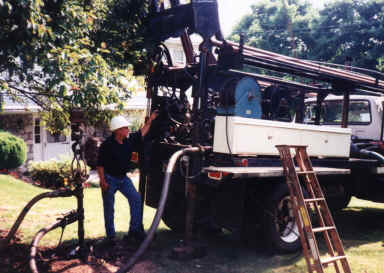|
| Birdsboro
company pressures wells into service |
|
By
David A. Kostival Reading
Eagle/Times correspondent |
| |
|
Homeowners who rely on wells for their water supply tend to get pretty nervous when the word drought gets tossed around in local weather forecasts. Underground water supplies that feed wells can be in danger of drying up without sufficient rain. But on-site wells also can be plagued by other problems, even in times of plentiful rains. Wells can easily become obstructed by silt, sediment or deposits, causing low water pressure and making hardships out of everyday routines, such as doing laundry, bathing or flushing toilets. Drilling a new well on your property is not usually a desirable solution for most homeowners, since it can cost
between $8,000 - $15,000. But there is another little-known solution.
|
| |
|

|
| |
|
Douglass S. Holmes, owner of Douglass Holmes Water Production, Inc., Birdsboro, said hydrofracturing a well--a method of forcing water to surface under extreme pressure--will almost always increase the water supply
“The process is a nice alternative to drilling on-site multiple wells because it can increase the water yield double or more,” Holmes said. “It is a very specialized process that very few businesses offer.”
Hydrofracturing, also known as hydraulic fracturing, costs about $2,500 - $3,000 and is a process by which water is injected under extreme pressure into the well to improve its production capabilities. |
| |
 |
The process, which dates back to the 1950s, was first developed in oil fields to increase production, then was adapted for water production in the ‘80’s. An inflatable rubber packer, which is similar to a giant balloon, is inserted in the well where it is inflated in order to seal the well. Thousands of gallons of water are forced under extreme pressure into the cavity of the well, below the packer. The pressure builds until the water breaks into a water vein that might not have been running into the existing well hole. Holmes said he can tell when the fracturing has occurred when the pressure, measured on gauges which can record pressures of up to 3,000 pounds per square inch, suddenly drops off.
The pressure also will clean any obstructions from the existing water-producing vein, allowing more water to flow freely.
|
|
|
|
|
“This changes people’s way of life,” Holmes said. “Many times the results have been phenomenal.” Holmes said that since he has been in business, he has fractured in excess of 1000 wells, with only one not producing the desired results. Holmes went into business as a water yield specialist in 1999.
Holmes explained the low water pressure that many times results from on-site wells can adversely affect how people live. “When you build a $500,000 home but you end up having to go to a laundromat or having to space out showers, the expensive home doesn’t really mean so much,” Holmes said. “People are eternally grateful for this service.” Barbara
Shivick, Boyertown, said that before she had the process done about two years ago, she was constantly running out of water. “It was a pain in the neck to be in the middle of taking a shower and simply run out of water,” Shivick said. “I would have to turn off the pump and wait an hour and a half to get a little water. It was an ongoing problem; I couldn’t do laundry or flush toilets.” Shivick said the problem was determined to be obstructed water veins. “I haven’t had a problem with water in
two years,” Shivick said.
|
|
